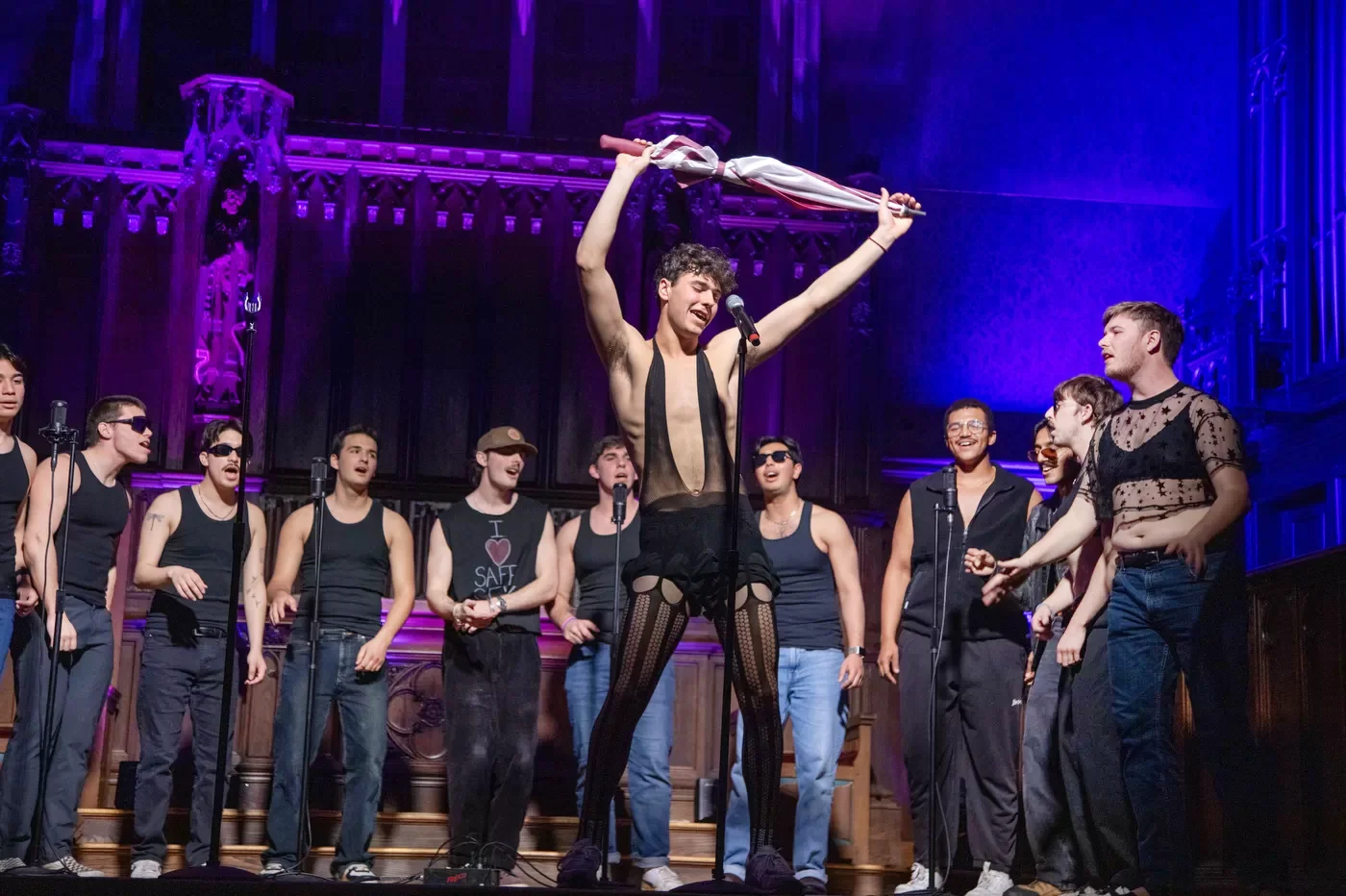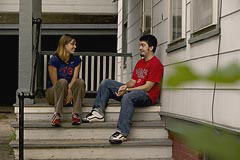
Summer’s a seasoning for students who stay
“Being at college, being away from home, you’re set to feel you’re on your own, you’re adult now,” says Matt Heffernan ’05, of Cranston, R.I.
But that feeling was premature. It wasn’t until this summer, when Heffernan got an apartment near Sabattus Street and a job in downtown Lewiston, that he really cleared the launch pad.
“It’s much more feeling like my own person,” he says. Heffernan, spending the summer doing archival work at the public library, likens life on one’s own to a current credit-card commercial: “Power bill, $30. Rent check, $750. Being a grownup, priceless.”
For the Bates students who stay around after Commencement, summer can offer a serious taste of adult life, whether it’s because they’re running their own households, meeting new career responsibilities or forming new new kinds of relationships.
At the weekly rate of $65 for a single or $55 per double room, 74 Bates students rented campus housing for part or all of summer 2004. Others took the bigger step and found their own digs; in a virtual, informal “show of hands” via e-mail, 23 students reported living in Lewiston but off campus.
Occupations vary widely for the students of summer. About 50 filled jobs around campus posted by the Student Employment Office — jobs as diverse as post office staffer, admissions tour guide, groundskeeper and, of course, director of the Student Employment Office.
Others pursued thesis research or other academic goals, often supported by a variety of grants. Chemistry research with a professor seems particularly popular, but this summer’s researchers have also been engaged in anthropology, biology, economics, political science and other disciplines. For instance, Nate Stambaugh ’06 and Leslie Milk ’05 developed a Short Term math unit for Assistant Professor Meredith Greer that uses roller coaster design to illustrate practical relationships between math and physics.
“For most students, conducting research full time in the summer gives them a real sense of what a graduate school or work environment would be like,” says Kerry O’Brien, an assistant dean of faculty. “They have a different sort of relationship with their professor who now becomes their boss as well as their teacher.”
Some students work downtown or farther afield, in career-related internships or community service. Fourteen, the most ever, have performed service work in Lewiston-Auburn through Bates’ Center for Service-Learning this summer. They have worked in family court, for a performing arts organization and a Franco-American archive, and with literacy development and youth programs.
For these students, “one of the most tangible and surprising benefits is getting to know the community and feeling like it’s truly theirs,” says Holly Lasagna, program director for the service-learning office. “Students often tell us how different Lewiston is from what they had imagined.”
At the same time, off campus or on, summer work often ties a student’s academic focus to its practical realities. Heffernan, for example, has an interdisciplinary major in working-class studies and is eyeing a museum career. Supported by a Mulford community service stipend, he spends 40-hour weeks organizing personnel records from a defunct local textile mill for use in a public archive.
What Heffernan does specifically is move pieces of paper from old low-tech file folders and boxes into new archival folders and boxes. He transfers about 225 files a day. The personnel files total nearly 18,000.
Students like him “learn a lot about the world of work,” says O’Brien.
Practical realities hold sway after work too. Before this summer, “none of the four people in my house had ever lived in an apartment by themselves,” says roller-coaster researcher Milk, of Elma, N.Y. It took some time, and the temporary loss of phone and electrical service, to get their lines of communication and responsibility sorted out.
Heffernan was introduced to independent living during a semester in Ireland. Along with the intricacies of Irish politics that he was there to study, he learned the more homely politics of communal food shopping, budgeting and cleaning.
“I remember being in Ireland and hearing my mother in my head,” he says. “My roommate had just vacuumed and I ate a sandwich and crumbs got on the floor. He said, ‘But I just vacuumed!’ He sounded exactly like my mother. Now I understand her more.”
In fact, crumbs and all, summer’s a time for the realm of human connection to take on new dimensions. For one thing, even for the students who remain in campus housing, summer’s social circle is smaller and more sedate.
“Basically, it’s very quiet here even on the weekends,” says Alexandra Porr ’06, of Cortlandt Manor, N.Y., who summered in Whittier House while running a community children’s program. “I’ve ended up leaving campus a lot, for friends’ houses in Maine or Boston.”
During the academic year, with around 1,700 students on campus, “I have such a good time because there are so many people to get to know,” says Darcy York ’05, of Harpswell, Maine, who is pursuing a photographic research project on campus.
“Every time you go to a party, there are hundreds of people you haven’t spoken to that you get thrown in with.” Now, says York, she’s part of a much smaller circle centered on a few blocks around Wood and Sabattus streets.
“And they’re more valid friendships, I think.”
For all these reasons, Matt Heffernan is eager to finish the transition from working-class studies to working in the real world. “As bubbles go, Bates is very nice,” he says. “But I never wanted to be in a bubble, and I’m very happy to be outside of it.”
He says, “For the past three years of my life I felt like a student because I lived on campus. Now I’m a person who goes to school.”





